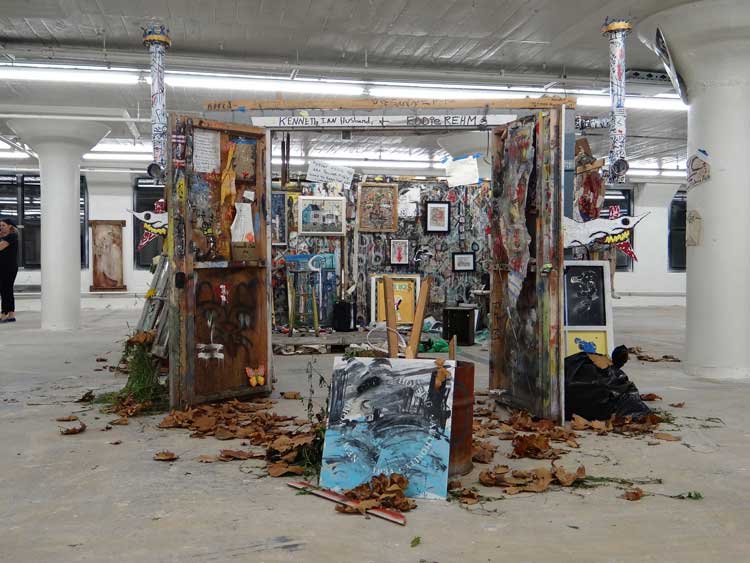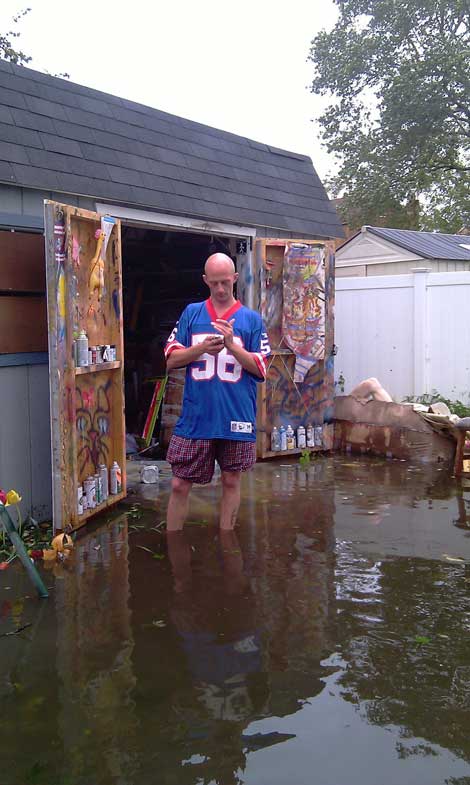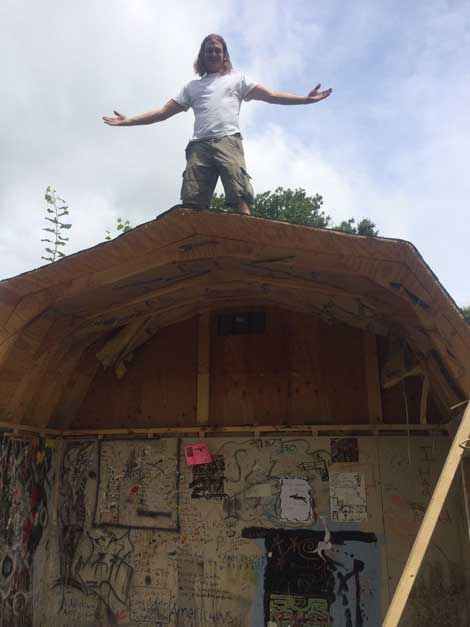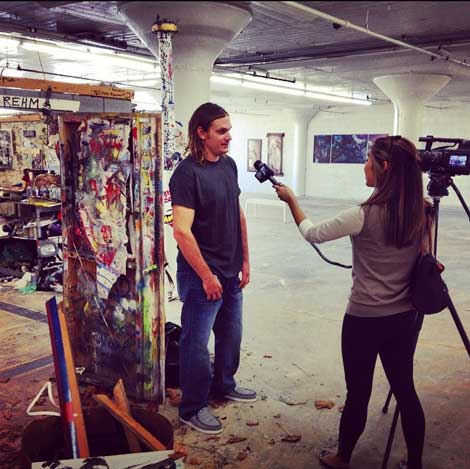During the summer of 2012, artists Eddie Rehm and Kenneth Ian Husband were enjoying something of a personal Golden Age in their tiny shared studio in Patchogue, a working class town on Long Island, New York. The studio itself was little more than a shed in the yard of Husband’s father’s modest home, but the painters made it a place for unbridled expression, camaraderie and collaboration. Rehm and Husband were in a perfect groove—the longtime friends had found that elusive rhythm so many artists desire—and they were making good work.
All that changed when Superstorm Sandy ripped through the Northeast on October 29, 2012.
What would become the largest Atlantic hurricane on record and America’s second costliest storm behind only Katrina devoured New York and New Jersey, leaving thousands underwater, without power and without homes. Husband and Rehm were among the damaged and displaced—overnight their world would be forever changed.
Two years later, both men are still struggling to get back on their feet and move forward, but they’re also looking back, just in time for the anniversary of the storm that took everything.
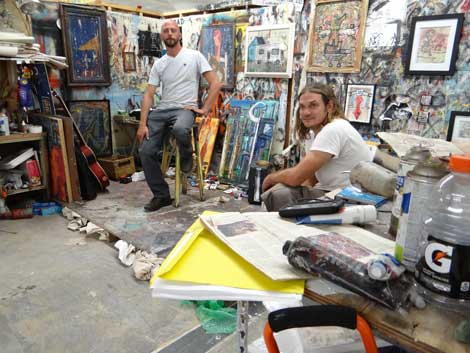
Husband and Rehm inside their Hurricane Sandy Wrecked Art Studio installation in Long Island City. Photo Courtesy of The Conception Gallery.
In October, Rehm and Husband reconstructed their wind– and water–ravaged studio as the centerpiece featured in “Brink,” a large group show including some 20 artists at Long Island City’s 13,000-square-foot Conception Gallery. The exhibition, curated by Rachel Wilkins-Blum and Mike Wolf examines the critical moment, being on the edge of success or failure, survival or death.
“It was a real fuck show for like two years,” Rehm says, recalling Sandy’s aftermath and how he and Husband stayed at the house and studio during the storm, packing up what they could. They watched how the Patchogue River steadily rose, enveloping the property until water began to rise up through the floors, taking everything in its path, including many of their cherished paintings.
“The house was destroyed,” Husband says, noting that it shifted off its foundation against the power of Sandy’s nearly 3-foot surge. Following the storm, Husband’s father’s house, where both Rehm and Husband lived, became no longer habitable, and for nearly two years, the Husbands were forced to stay in a camper, steps from the front doors, as they waited for federal assistance and insurance payouts.
Meanwhile, Rehm found other accommodations and over time, both artists began the slow process of recovery and a return to painting, which now reflects the weight of their collective loss. This connection is most obvious in works like Husband’s Home, a roughly painted picture of his family’s camper, absurdly parked feet from their ruined house. “My art became more about struggles I had to face. It became more personal, more honest,” he says.
Eventually the Husbands were able to relocate, and Rehm and Husband recovered the broken pieces of their studio in order to rebuild it as an installation titled Misappropriation of a Modern Artifact in the “Brink” exhibition.
The reconstructed studio is made from the actual shed’s warped wooden walls and discarded windowpanes, every inch covered in paint and scrawled words. Inside, the artists emptied boxes of old studio detritus—empty Marlboro boxes, spent paint tubes and spray paint, bottles, broken brushes, plastic wrap—along with art supplies, piles of paper sketches, books, show cards, newspapers and anything else they found in the actual space. Husband and Rehm even put their oil drum fire pit by the entrance and scattered the floor with dead leaves and green foliage taken from the old property.
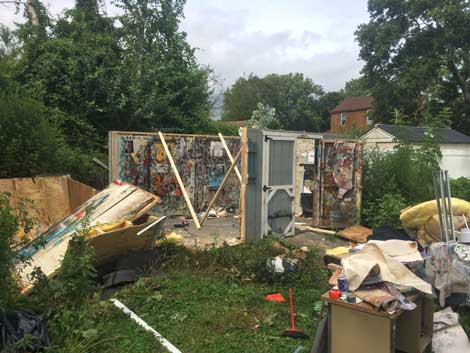
Image of “Misappropriation of a Modern Artifact,” during the break down process in Patchogue. Photo Courtesy of Eddie Rehm.
The most exciting aspect of Misappropriation of a Modern Artifact is the interactivity. “We invited people to come in and touch shit,” Rehm says. “We even set up an easel to let them paint.” This invitation to literally touch, play and even paint in Rehm and Husband’s world allows the viewer to more closely identify with the artists’ creativity and joy, while also connecting viscerally with their deep sense of loss.
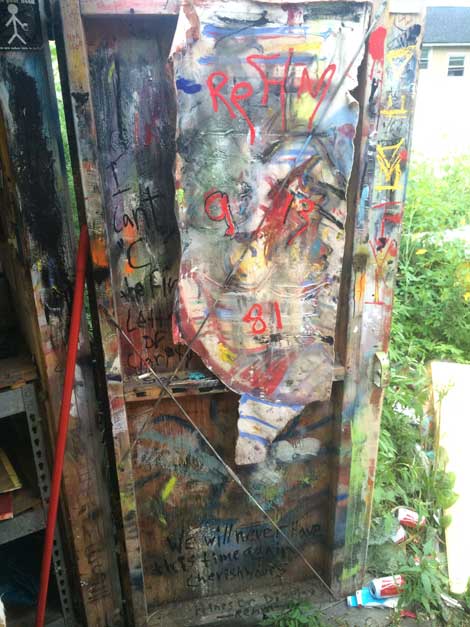
Studio Door inscription which reads, ”Cherish the Time You Have, for Ours is On Display.” Photo Courtesy of Eddie Rehm.
“I was sitting in the shell of the home where I grew up, watching the mold grow to the ceiling,” Husband muses about when he first had the urge to share his painful journey from happiness to misery, and his efforts to crawl back out. “Nothing is to be taken for granted—not running water, not family and most of all not love.”
Above video: “The Art of Hope” Produced and Directed by Rachel Wilkins-Blum.
“Brink” runs through Nov 28, 2014.
CONCEPTION GALLERY, The Falchi Building
31-00 47th Ave, Long Island City, NY 11101
www.theconceptiongallery.com/

